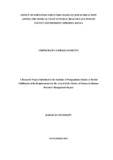| dc.description.abstract | The public health facilities in Kenya provide diverse health services to its citizens
throughout the country. Public health employees across the country have exhibited some
dissatisfaction in the recent past which has led to poor service delivery as well as strikes.
This is as a result of delays in salaries, poor remuneration, poor working conditions, lack
of Personal Protective Equipment (PPEs) and non-inclusion of employees in airing their
views. These issues and others are indicative of having demotivated and unsatisfied
employees. This study therefore purposed to establish the effect of employee voice
strategies on job satisfaction among the medical staff in public health facilities in County
government of Bomet. Specifically, the study sought to examine whether attitude
survey, upward communication, employee participation and suggestion schemes have an
effect on job satisfaction of employees in public health facilities in County government
of Bomet. The study was guided by Herzberg two-factor theory and anxiety uncertain
theory.A cross sectional descriptive research design was used. The study targeted 205
medical staff drawn from three public health facilities in County government of Bomet.
Stratified random sampling technique was used. A sample size of 136 medical staff was
used in the study. A questionnaire was used for data collection. Pilot study was
undertaken in Kericho referral hospital. Validity and reliability was carried out using
Cronbach alpha coefficient. The validity of the study was checked using content validity
through expert judgement. Descriptive analysis was used to describe the study constructs
using frequencies, percentages, and means. The study undertook a correlational analysis.
The results of the study indicated that all the independent variables had a statistically
significant association with the job satisfaction. The study found that the attitude survey
had a statistically significant influence on job satisfaction levels. The study concluded
that the attitude survey had a statistically significant influence on the job satisfaction
levels. The study further found that the unstandardized regression beta stood at 0.597
which indicated that a unit increase in attitude survey would lead to 0.597 change in the
job satisfaction. The researcher found that the upward communication had a statistically
significant influence on the job satisfaction aspects. The researcher further observed that
the regression coefficient that was achieved for the influence of the upward
communication on the job satisfaction was 0.404. This indicated that a unit change in the
upward communication would be associated with 0.404 change in the job satisfaction.
The study found that employee participation within the Bomet hospitals had a
statistically significant influence on job satisfaction in the county. The study further
found that the regression coefficient stood at 0.546 which implied that a unit change in
the employee participation would lead to 0.546 change in the job satisfaction. The study
found that the suggestion schemes had a statistically significant influence on the job
satisfaction levels. The unstandardized regression coefficient that were observed stood at
0.652 which implied that a unit change in the suggestion schemes led to 0.652 change in
the job satisfaction. The study recommends that the healthcare management should focus
on the attitude survey, upward communication, and suggestion schemes in order to
improve on the job satisfaction amongst the workers | en_US |

